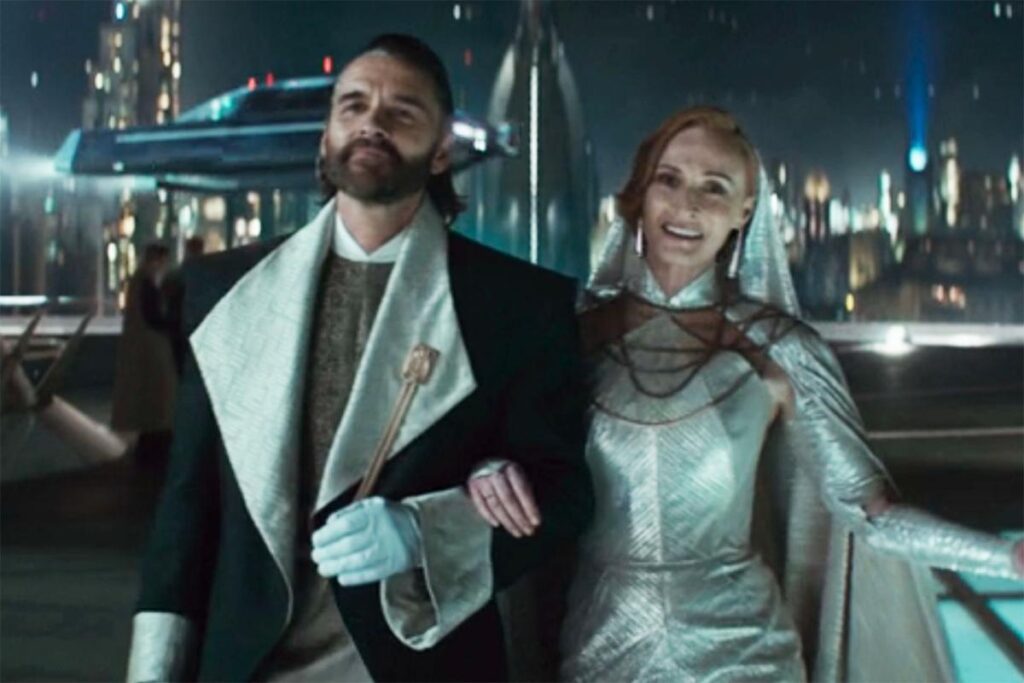I can’t tell you how much good it does my heart to watch a Star Wars show that’s horny. Actually horny, not just “oh look, it’s a hunky guy with his shirt off, aren’t we all excited” Kylo Ren/Steve Rogers/Disney horny. Horny enough to make Dedra Meero topping Syril Karn more or less canon. Horny enough to finally, finally have a queer kiss onscreen because, despite their danger, it’s been years, and Vel Sartha and Cinta Kaz can’t keep their hands off one another. Horny enough for Bix Caleen to only semi-jokingly ask her boyfriend, Cassian Andor, to bring his glamorous fashion-designer cover identity home with him one night so she can have sex with someone “very, very pretty.” I’m all for a smoldering kiss between Han Solo and Princess Leia, don’t get me wrong, but this is something else. This is sex, not romance, or not just romance, and it makes Andor feel alive even in the midst of death.
Meanwhile, Andor continues trafficking in shades of gray so murky they’re hard to see through. We’ve already seen that Dedra and her boyfriend Syril are working with her boss, Major Partagaz, to deliberately stoke an insurgency on Ghorman, a planet central to the plans of (we know this; they don’t) Death Star supervisor Director Orson Krennic. They’re painstakingly feeding the nascent Ghor insurgency information, allowing them to hit their supply carriers and get away with it, so that they’ll have a pretext for cracking down.
We find out this episode that this is more or less Luthen Rael’s plan for the planet, too. He’s disgusted with Cassian’s trepidatious report on the Ghorman Front. So what if they’re operationally insecure and way too late to block the Empire’s planned armory in the middle of their capital city? This is a rich, politically powerful planet, not some insignificant Outer Rim backwater. The very fact that textile barons like Carro Rylanz, the local rebel leader, are willing to step up shows what a promising front in the war against the Empire Ghorman can be. Cassian’s thinking too small, Luthen says. He can no longer afford to be either a common thief or a mere foot soldier. He has to “think like a leader,” and a leader would put Ghorman in play no matter what.
“If it goes up in flames?” the skeptical Rebel asks.
“It will burn very brightly,” Luthen replies coldly. Omelets require broken eggs; revolutions require martyrs.
Those martyrs don’t include Luthen, his right-hand woman Kleya, Cassian, or Bix just yet. Cassian is outraged to learn that Luthen approached the exhausted, addicted, burned-out Bix for a mission while Andor was out of town, even if the Rebel leader ultimately decided against sending her. Both men want Bix as healthy as possible, for their own reasons; Cassian insists that if Luthen’s really serious about this, he needs to help him get Bix back on track.
Luthen’s therapeutic methodology is decidedly Luthenesque. He’s heard from his ISB mole, Supervisor Lonni Jung, that Doctor Gorst, the man who tortured Bix into the mess she is now, is being promoted to head a whole division employing his methodology. So when the fascist scumbag returns to his office with takeout food one night, he finds Bix waiting for him. She straps him into his own torture chair, subjects him to the same nightmarish sonic punishment he inflicted upon her, and leaves, telling him “It’ll only feel like forever.” Indeed, she and Cassian blow the whole place sky-high a few minutes later.
Andor is not a show that traffics in easy catharsis. The magnificent “one way out” speech delivered by Andy Serkis’s prisoner character Kino Loy last season led to the deaths of almost all the prisoners involved in the prison break. Cassian’s late adoptive mother Marva’s funeral-procession message to the locals to “fight the Empire” forced Cassian and his friends to flee their planet forever, and (we now know) unified Dedra and Syril. Successful heists usually involve at least one rat trying to undermine the whole thing for their own benefit. On and on it goes.
So it is with Cassian and Bix’s killing of Gorst. I’ve never been able to find solid sourcing on the purported claim by the prolific Soviet sniper Lyudmila Pavlichenko to have killed “no men — fascists, 309,” but I’m sympathetic to the underlying ideology. The cure for fascism is lead. But I don’t think it ennobles Bix to torture this man until Cassian blows him to smithereens. Do you? Do you think that that the killing of the man himself will end the nightmares he engendered? Or is this a wound that will never heal, even after the knife that dealt it is melted down into nothing?
And it should be noted how this victory is contextualized by the episode. Bix and Cassian kill Gorst and get away clean. With the unwilling help of Supervisor Jung, Kleya and Luthen remove the listening device from billionaire Davo Sculdun’s art gallery even as he shows it off to the dignitaries assembled for his big party — including both Mon Mothma and Director Krennic, who clearly wants nothing more than to slap her in irons for her heterodoxy. The sequence is incredible: an absolute nail-biter, entirely based on whether or not two characters can be unobtrusive and unscrew something the size of a bottlecap. Even so, Luthen and Kleya walk away laughing, joking that they should have killed Krennic right then and there while they had the chance, opsec be damned. “My face hurts from smiling,” Luthen says (while paraphrasing The Rocky Horror Picture Show of all things), but in the end his smile is real.
But elsewhere in the galaxy, the Ghorman operation is going down — led by our old friend Vel, and her old friend Cinta. The passion and pathos of their final days together are unique to Andor, an emotional tone only this Star Wars project can strike. The same is true of their dictatorial approach to running the operation, especially towards the overconfident rebel Samm (Abraham Wapler) and the suspiciously truculent Dreena (Ella Pellegrini). They can’t afford to have people on this mission who think they’re too important to follow orders.
But that’s what they wind up with. The mission goes off more or less without a hitch, as it’s supposed to: Imperial agents Dedra, Syril, and Partagaz are watching and listening all along. The problem comes when an otherwise sympathetic local who’s not in on the plan stumbles across the site of the hijacked carrier and tries to pass through, coming into conflict with Samm. In the tussle that ensues, Samm’s blaster goes off, and Cinta is struck and killed.
Vel’s monologue about this is ferocious even by the standards of Andor, which has given us both Stellan Skarsgård and Forest Whitaker talking about lighting themselves on fire to fuel the Rebellion. When she sees that the young Ghor rebel is crying, Vel can’t take it. “This is on you now,” she spits, the words incandescent as they’re shot from the mouth of actor Faye Marsay. “This is like skin. You’re taking her with you wherever you go for the rest of your useless life.” Calling him a “whining, simpering, foolish child,” she tells him “Don’t you dare cry. You’ll make up for this forever.”
There’s no walling yourself off from pain on Andor. Not just any pain, either — political pain, the pain inflicted on you by cohesive systems designed to order civilization according to its masters’ whims. Their existence taints and implicates everyone they touch. So, inevitably, does fighting against them. Bravery, Andor suggests, is in many ways the willingness to make yourself less human so that other humans can live more fully human lives. There’s no guarantee this will work, either. You have to be willing to burn your life to make a sunrise you know you’ll never see. Behind all the gray, that’s the only light left.
Sean T. Collins (@theseantcollins) writes about TV for Rolling Stone, Vulture, The New York Times, and anyplace that will have him, really. He and his family live on Long Island.
Read the full article here








